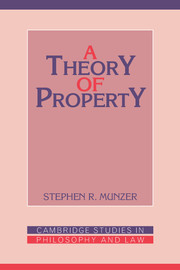Book contents
- Frontmatter
- Contents
- Preface and acknowledgments
- 1 Property, justification, and evaluation
- Part I Property rights and personal rights
- Part II From individuals to social context
- Part III Justification and distributive equity
- Part IV Applications
- 12 Business corporations
- 13 Gratuitous transfers
- 14 A moral and political theory of takings
- 15 Takings and the constitution
- Table of cases
- Index of names
- Index of subjects
15 - Takings and the constitution
Published online by Cambridge University Press: 05 June 2012
- Frontmatter
- Contents
- Preface and acknowledgments
- 1 Property, justification, and evaluation
- Part I Property rights and personal rights
- Part II From individuals to social context
- Part III Justification and distributive equity
- Part IV Applications
- 12 Business corporations
- 13 Gratuitous transfers
- 14 A moral and political theory of takings
- 15 Takings and the constitution
- Table of cases
- Index of names
- Index of subjects
Summary
SOME TRADITIONAL JUDICIAL TESTS
Even if the moral and political theory developed in Chapter 14 is sound, it hardly follows that it is part of federal constitutional law. Justice Holmes once observed that the United States Constitution did not enact Herbert Spencer's Social Statics. It did not enact the basic theory of property either, or the moral and political theory of takings constructed on it. Still, the latter theory has constitutional implications, and this chapter tries to explain them. The itinerary is as follows. This section examines some traditional judicial tests for takings. The next discusses some academic approaches to takings. Later sections elaborate and apply a new constitutional perspective. The chapter as a whole shows how the account of property developed in this book can be translated into concrete legal applications.
The present examination is limited to judicial doctrines relating to the takings clause of the Fifth Amendment – “nor shall private property be taken for public use, without just compensation.” Its language raises constitutional questions concerning what is “private property,” whether it has been “taken” for a “public use,” and what counts as “just” compensation. The constitutional inquiry typically becomes a search for a “test” – that is, a standard that affords clear and definite guidance to a competent lawyer or judge after careful examination – for the existence of a taking and, to a lesser extent, for the proper compensation.
- Type
- Chapter
- Information
- A Theory of Property , pp. 442 - 470Publisher: Cambridge University PressPrint publication year: 1990

